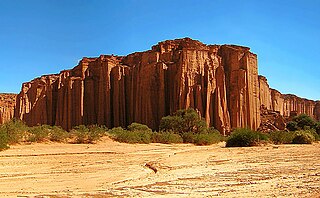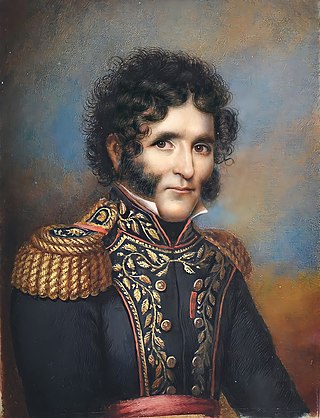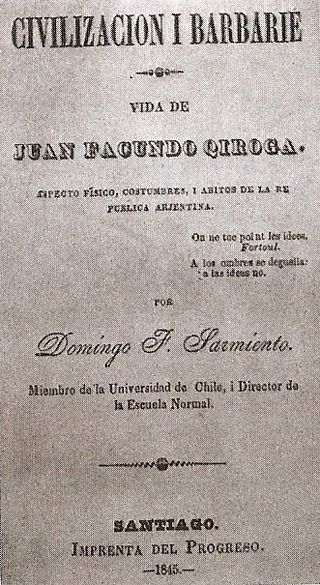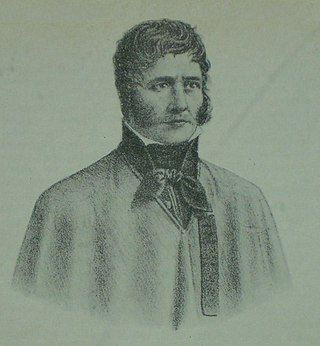Related Research Articles

Domingo Faustino Sarmiento was an Argentine activist, intellectual, writer, statesman and President of Argentina. His writing spanned a wide range of genres and topics, from journalism to autobiography, to political philosophy and history. He was a member of a group of intellectuals, known as the Generation of 1837, who had a great influence on 19th-century Argentina. He was particularly concerned with educational issues and was also an important influence on the region's literature.

La Rioja, oficially Province of La Rioja is a province of Argentina located in the west of the country. The landscape of the province consist of a series of arid to semi-arid mountain ranges and agricultural valleys in between. It is in one of these valleys that the capital of the province, the city of la La Rioja, lies. Neighboring provinces are from the north clockwise Catamarca, Córdoba, San Luis and San Juan. The dinosaur Riojasaurus is named after the province.
Juan Quiroga may refer to:

Juan Facundo Quiroga was an Argentine caudillo who supported federalism at the time when the country was still in formation.

Facundo: Civilization and Barbarism is a book written in 1845 by Domingo Faustino Sarmiento, a writer and journalist who became the second president of Argentina. It is a cornerstone of Latin American literature: a work of creative non-fiction that helped to define the parameters for thinking about the region's development, modernization, power, and culture. Subtitled Civilization and Barbarism, Facundo contrasts civilization and barbarism as seen in early 19th-century Argentina. Literary critic Roberto González Echevarría calls the work "the most important book written by a Latin American in any discipline or genre".
Quiroga is a Spanish surname; it originates from the valley and locality of Quiroga in the province of Lugo in the Galician region of Spain. Legend has it that in the year 715, a powerful knight defended the entrance to Galicia through the Valley of Quiroga from invasion by the Moors. As weapons, he used iron-tipped stakes which are the basis for the Quiroga coat-of-arms; five silver stakes (spears) positioned vertically on a green (sinople) background.
General José Ignacio de Gorriti was an Argentine statesman, soldier and lawyer. He was a representative to the Congress of Tucumán which on 9 July 1816 declared the Independence of Argentina.

Barranca de Yaco or Barranca Yaco is a geographical feature along the ancient camino real of the Viceroyalty of the Río de la Plata, located between Villa Tulumba and Sinsacate, in the province of Córdoba, Argentina.
Facundo Hernán Quiroga is an Argentine retired professional footballer. Mainly a central defender, he could also play as a right back.
The Battle of San Roque was part of the Argentine Civil War. It was fought on the Primero River, near the city of Córdoba, Argentina, on 22 April 1829. The Federalist forces of Córdoba Province governor Juan Bautista Bustos were defeated by the Unitarian forces of General José María Paz. As a result of his victory, Paz assumed the office of provincial Governor.

Nácate is a small village in General Juan Facundo Quiroga Department Department in La Rioja Province in northwestern Argentina.
The Battle of La Ciudadela was a fight during the Argentine Civil Wars between Federalist troops commanded by Facundo Quiroga and Unitarian troops of Gregorio Aráoz de Lamadrid on the outskirts of San Miguel de Tucumán, Argentina, on 4 November 1831. It resulted in a decisive victory by the Federalists.
Martín Yanzón was an Argentine soldier and caudillo who died fighting against the supporters of the dictator Juan Manuel de Rosas.
The Battle of Rodeo del Chacón, fought in Potrero de Chacón, Argentina on 28 March 1831, was a battle during the civil war between Unitarian and Federalist forces. It ended with the victory of General Facundo Quiroga, one of the most capable and well known of the Federalist caudillos.

José Benito Villafañe José Benito Villafane was an Argentine soldier who participated in the war of independence and was governor of La Rioja Province, Argentina, under the protection of the caudillo Facundo Quiroga.
The Battle of Rincón de Valladares was a battle during the Argentine Civil Wars. It was fought between Federalist forces led by Facundo Quiroga and Unitarian forces under Governor Gregorio Aráoz de Lamadrid, near the city of San Miguel de Tucumán. Quiroga was the victor, forcing Lamadrid to resign and go into exile in Bolivia, leaving the government of Tucumán Province in the hands of the Federalists.
General Juan Facundo Quiroga is a department of La Rioja Province in Argentina.

Alfredo Demarchi (1857-1937) was an Argentine businessman and politician, who held various state positions, including as Vice Governor of the Province of Buenos Aires.
Facundo Quiroga (1788-1835) was an Argentine caudillo.
References
- ↑ Ministerio del Interior (in Spanish)